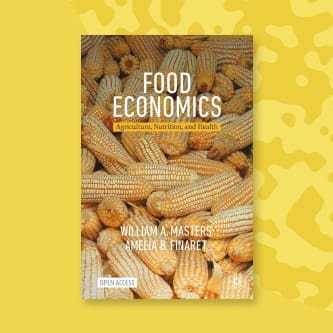William Masters works on the economics of global agriculture and food policy. He is a Fellow of the Agricultural and Applied Economics Association, and has a forthcoming textbook on Food Economics: From Agriculture to Health. He visited Bellagio in May 2023 to research how new data on access to healthy and sustainable diets can best be used to improve farming and food systems, building on the adoption of diet cost and affordability metrics as a new indicator of global food security by U.N. agencies, the World Bank, and national governments. He is a Professor in the Friedman School of Nutrition and the Department of Economics at Tufts University.

A few words from William
“The timing of my residency was lucky, giving me project material that I could later include in the book. Much of that is in a section called Food Access and Affordability of Healthful Diets, tracing the history up to our most recent data and discoveries on this topic. Also in my residency cohort I learned a lot from Kasia Chmielinski, and we’ve followed up about how to use AI tools around the book. Ideas from others in my cohort played a big role too, especially learning from Ray Jayawardhana, Conrad Keating and Sheri Fink about how to tell complicated stories in meaningful ways. The chance to talk with them about their books made me much more ambitious about what good writing can accomplish.”
A Quote from Food Economics
“Why Are Kiwis So Cheap?
Damn supply and damn demand:
Why cheap hogs and costly ham?
Bargain wheat, expensive flour,
The oldest villain’s market power.
Just one seller makes us nervous,
Like that U.S. Postal Service:
They may offer bargain prices,
But who disciplines their vices?
Middlemen have long been blamed
For every market that’s inflamed,
Yet better explanations come
From many a Hyde Park alum.
Modern views from Chicago-Booth
Give a nuanced view of truth,
Steven Levitt and John List
Made each of us a freakonomist.
We let data speak its mind
No matter what Friedman opined
And find the price of fruit and veg
To be driven by the market’s edge.
Like the tail that wags the dog,
Marginal thinking clears the fog:
Sellers, buyers, traders too,
Interact and prices ensue.
A kiwi costs 33 cents
Simply because no one prevents
Another farm or New York store
From entering and selling more.
In contrast apples may be dear,
For reasons that will soon be clear:
Picking them’s below our station,
To lower costs we need migration.
Bananas have a different story,
Seedless magic, breeder’s glory,
Cheap to harvest and to ship,
Who cares if workers get paid zip?
Each crop’s method of production,
Where it grows and how it’s trucked in,
Satisfies some needs quite cheaply
While other costs will rise more steeply.
A buyer’s choices matter too,
For nonsense stuff like posh shampoo,
Prices are not down to earth,
The more you pay the more it’s worth.
Behavior is as behavior does,
Maybe some things are ‘just because,’
Much of life’s a mystery,
A habit due to history.
For prices, though, it’s competition
Plus tariffs set by politicians,
That determines whether we see
Such delightfully cheap kiwi.”
Synopsis
Food Economics provides a unified introduction to the economics of agricultural production, business decisions, consumer behavior, and the government policies that shape our food system.
This open access textbook begins with economic principles derived using graphical techniques to explain and predict observed prices, quantities, and other outcomes as a result of individual choices influenced by market structure and public policies. The second half of the book explores available data globally and for the U.S., covering a wide range of questions in agriculture and economic development, food marketing, and consumption.
Food Economics and its accompanying online resources are designed for advanced undergraduate or introductory graduate courses in agriculture, food, and nutrition policy. The book covers the standard diagrams taught in principles-level courses, with concrete examples and practical insights regarding food production, consumption, and trade. Online resources include data sources, and course materials, including slides, exercises, exams, and answer keys.
Explore More
Interview with Anotida Chikumbu
Related

September 2024
The September 2024 Bellagio Bulletin highlights innovative work from Joseph Stiglitz, Lesly Goh, Emiliano Rodriguez Nuesch, Manuel Pastor, Chris Benner, and Payal Arora, all focused on creating more sustainable and equitable global infrastructures.
More